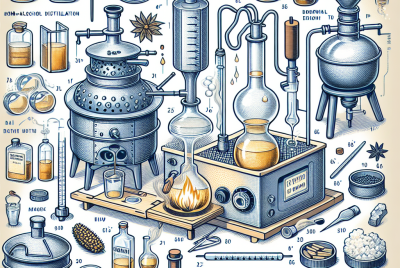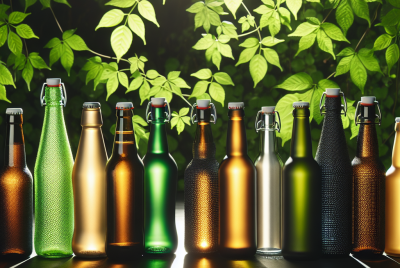Are Beer Bottles Recyclable?
Did you know that beer bottles are not only perfect for holding your favorite brew, but they are also highly recyclable? With their sturdy glass construction, beer bottles can be easily transformed into new bottles or other glass products through the recycling process. Recycling beer bottles not only helps conserve resources, but it also reduces waste and helps protect the environment. So, next time you crack open a cold one, remember to toss that bottle into the recycling bin and give it a second life!

The Importance of Recycling Beer Bottles
Beer bottle recycling plays a crucial role in reducing waste and minimizing the environmental impact of our consumption habits. By choosing to recycle beer bottles, you contribute to conserving energy and resources, while also supporting the recycling industry and the creation of new products. It’s a simple and effective way to make a positive difference for the planet.
Reducing Waste and Environmental Impact
One of the primary reasons why recycling beer bottles is essential is the reduction of waste and the environmental impact associated with their disposal. By recycling glass bottles, we can prevent them from ending up in landfills, where they take thousands of years to decompose. Instead, these bottles can be transformed into new products, significantly reducing the strain on natural resources.
Conserving Energy and Resources
Recycling beer bottles also helps conserve energy and resources. Manufacturing new glass bottles from raw materials requires a tremendous amount of energy, including the extraction and processing of minerals. By recycling glass bottles, we can reduce the demand for these resources and the energy needed for their production. This, in turn, helps combat climate change and reduces our reliance on fossil fuels.
Creating New Products
Recycling beer bottles is not just about waste reduction; it also opens up opportunities for the creation of new products. Once glass bottles are collected and sorted, they can be crushed into small pieces, known as cullet. This cullet is then melted down and used to manufacture new glass products, such as new beer bottles, jars, and even fiberglass for insulation. By recycling beer bottles, we give them a new life and contribute to a circular economy.
Supporting the Recycling Industry
Recycling beer bottles also provides crucial support to the recycling industry. It helps create jobs in sorting facilities, recycling plants, and manufacturing facilities. Additionally, the demand for recycled glass encourages the growth of recycling technologies, innovation, and infrastructure. By actively participating in beer bottle recycling, we contribute to a sustainable and thriving recycling industry.
Types of Beer Bottles
When it comes to beer bottles, various types are commonly used, each with its own characteristics and recyclability.
Standard Glass Beer Bottles
Standard glass beer bottles are the most common type of beer packaging. They are traditionally made of brown or green glass, which helps protect the beer from harmful UV rays. These bottles are widely accepted for recycling and have a high recyclability factor. If properly handled and recycled, they can be efficiently transformed into new glass products.
Screw-Top Glass Beer Bottles
Screw-top glass beer bottles, also known as twist-off bottles, have a threaded cap that allows for easy opening and resealing. While these bottles offer convenience, their recyclability can vary. Some recycling facilities may accept them, while others may not, due to challenges in separating the glass from the metal cap. It is essential to check with your local recycling guidelines or contact recycling facilities to understand if they accept screw-top glass beer bottles.
Cans
Cans are an increasingly popular packaging option for beer. Made from aluminum, they are lightweight, portable, and easily recyclable. Aluminum cans have a high recycling rate and can be efficiently melted down and reused in the manufacturing of new cans or other aluminum products. Their recyclability, coupled with the energy savings associated with aluminum recycling, makes cans an environmentally friendly choice.
Plastic Beer Bottles
In recent years, plastic beer bottles have gained some popularity as an alternative to glass or cans. These bottles are typically made of PET (polyethylene terephthalate) plastic, which is lightweight and shatter-resistant. However, the recyclability of plastic beer bottles can vary depending on the local recycling systems and facilities. In some areas, they are accepted for recycling, while in others, they may need to be disposed of in the regular trash. It is important to check with local recycling guidelines and facilities to determine the appropriate disposal method for plastic beer bottles.
The Recyclability of Different Beer Bottles
The recyclability of beer bottles depends on their material composition and the availability of appropriate recycling systems and facilities.
Glass Beer Bottles
Glass beer bottles have a high recyclability factor. The glass can be easily separated from other materials during the recycling process. Once collected, the bottles are sorted, cleaned, and crushed into cullet. This cullet is then melted and molded into new glass products. Glass-to-glass recycling, where old glass bottles are directly transformed into new ones, is an efficient and environmentally friendly process.
Screw-Top Glass Beer Bottles
The recyclability of screw-top glass beer bottles can vary depending on the recycling facilities available in your area. While some facilities may accept them, others might have difficulty separating the glass from the metal cap. It is advisable to check with local recycling guidelines or contact recycling facilities to determine the accepted materials.
Cans
Cans have a high recyclability rate and are widely accepted for recycling. Aluminum cans can be easily melted down and reused in the manufacturing of new cans or other aluminum products. Recycling aluminum cans saves significant amounts of energy and resources compared to producing new cans from raw materials. When properly recycled, cans contribute to a sustainable and circular economy.
Plastic Beer Bottles
The recyclability of plastic beer bottles varies depending on local recycling systems and facilities. Some areas have the necessary infrastructure to recycle PET plastic bottles, while others do not. Plastic beer bottles may need to be disposed of in regular trash if recycling options are not available. It is crucial to check with local recycling guidelines and facilities to ensure proper disposal.

Factors Impacting Beer Bottle Recyclability
Several factors can impact the recyclability of beer bottles, regardless of their material composition.
Contamination
Contamination is a significant factor that can affect the recyclability of beer bottles. When bottles are not rinsed properly before recycling, residues can contaminate the glass, reducing its quality and recyclability. It is important to empty and rinse beer bottles thoroughly to ensure they can be efficiently recycled.
Labels and Adhesives
Labels and adhesives on beer bottles can also impact their recyclability. Paper or plastic labels can be separated during the recycling process, but it is crucial to remove any excessive adhesives before recycling. Check local guidelines or contact recycling facilities to understand if there are specific label removal requirements.
Color and Composition
The color and composition of beer bottles can also influence their recyclability. Clear and amber glass bottles are more widely accepted for recycling, as their color does not interfere with the production of new glass products. However, certain colors, such as green or blue, may have limited recycling options. Additionally, composite materials like colored or patterned glass may impact their recyclability. Check with local recycling guidelines or facilities to understand specific requirements.
Design and Shape
The design and shape of beer bottles can impact their recyclability, especially for glass bottles. Non-standard shapes or designs with intricate details may complicate the recycling process. Simple and standardized bottle designs are generally easier to recycle. When possible, choose beer bottles with straightforward shapes to ensure better recyclability.
Recycling Process for Beer Bottles
Recycling beer bottles involves several steps in a carefully managed process. Understanding this process can provide insights into the importance of proper recycling practices.
Collection
The first step in the recycling process is the collection of beer bottles. This can occur through curbside recycling programs, drop-off centers, or specialized collection bins. It is essential to separate beer bottles from other types of glass or materials to ensure efficient recycling.
Sorting
After collection, beer bottles are sorted based on their material type. Glass bottles are separated from other materials, such as metal caps or plastic labels and placed in designated glass recycling streams. The sorting process ensures that different materials can be appropriately handled and processed.
Cleaning
Once sorted, beer bottles undergo a cleaning process to remove any remaining contaminants, such as labels or residues. The bottles are typically washed using specialized equipment to ensure they meet the quality standards for recycling.
Crushing and Shredding
After cleaning, beer bottles are crushed or shredded into smaller pieces, known as cullet. This process helps reduce the volume of glass and prepares it for melting. Properly crushed bottles increase the efficiency of the melting and molding stages.
Melting
Cullet from beer bottles is then melted at high temperatures in furnaces. The melted glass can be molded into various forms, including new beer bottles, jars, or glass fibers for insulation. The melting process reduces the energy requirements compared to manufacturing glass from raw materials.
Manufacturing
Finally, the melted glass is transformed into new glass products through different manufacturing processes. The recycled glass is carefully molded and shaped to meet the required specifications for various applications. Once cooled, the new products are ready to be used and contribute to a sustainable and circular economy.
Recycling Challenges for Beer Bottles
While recycling beer bottles offers significant benefits, there are several challenges that can hinder the process and impact the overall efficiency of recycling systems.
Consumer Knowledge and Behavior
One of the key challenges in beer bottle recycling is consumer knowledge and behavior. Many individuals are not aware of the recyclability of different types of beer bottles or the specific requirements for proper recycling. Lack of awareness can result in improper disposal or contamination of recyclable materials. Educating consumers about the recycling process and best practices is critical to overcome this challenge.
Infrastructure and Facilities
A lack of adequate infrastructure and facilities can make beer bottle recycling challenging. Not all communities have access to recycling facilities that accept and process glass, screw-top bottles, or plastic beer bottles. Improving and expanding recycling infrastructure is crucial to ensure widespread access and effective recycling systems.
Existing Recycling Systems
The existing recycling systems in some areas may not accommodate all types of beer bottles. Inadequate infrastructure or limited capacity can lead to certain bottles being excluded from recycling programs. Collaboration between municipalities, recycling companies, and manufacturers is necessary to develop comprehensive recycling systems that can handle various types of beer bottles.
Quality Control and Contamination
Maintaining quality control in the recycling process is essential to ensure the production of high-quality recycled materials. Contamination, such as non-recyclable materials or improperly cleaned beer bottles, can reduce the overall quality of recycled glass or other materials. Implementing strict quality control measures and educating individuals on proper recycling practices are vital steps to address this challenge.
Benefits of Recycling Beer Bottles
Recycling beer bottles offers a wide range of benefits that extend beyond waste reduction and environmental impact. But if you’re a home brewer you most likely want to re-use your bottles so you are already helping sustainability and the environment!
Conserving Natural Resources
By recycling beer bottles, we contribute to the conservation of natural resources. The use of recycled glass in manufacturing reduces the need for raw materials, such as sand, limestone, and soda ash. Preserving these resources helps protect natural habitats, reduce energy consumption, and minimize the environmental impact of raw material extraction.
Reducing Energy Consumption
Recycling beer bottles significantly reduces energy consumption compared to manufacturing new glass bottles from raw materials. The melting and molding process for recycled glass requires less energy, resulting in lower carbon emissions and greenhouse gas emissions. This energy savings contribute to the fight against climate change and the transition to a more sustainable future.
Reducing Greenhouse Gas Emissions
The production of new glass bottles from raw materials contributes to greenhouse gas emissions. By recycling beer bottles, we reduce the demand for raw materials and the associated emissions from extraction, manufacturing, and transportation. This reduction in greenhouse gas emissions directly contributes to mitigating climate change and its adverse effects.
Creating Green Jobs
The recycling of beer bottles supports the creation of green jobs and contributes to the growth of the recycling industry. From collection and sorting to cleaning, crushing, and manufacturing, the entire recycling process requires a skilled workforce. By actively participating in beer bottle recycling, we support the creation of employment opportunities and contribute to a sustainable economy.
Recycling Beer Bottles vs. Reusing Beer Bottles
While recycling beer bottles is an effective way to reduce waste and environmental impact, reusing beer bottles also offers its own set of advantages, especially for us home brewers!
Recycling
Recycling beer bottles involves the transformation of used bottles into new products. It requires energy, water, and resources to collect, sort, clean, and process the bottles. However, recycling helps conserve natural resources, reduce energy consumption, and minimize waste. It also stimulates the recycling industry and supports the creation of green jobs.
Reusing
Reusing beer bottles involves using the same bottle multiple times before it is eventually recycled. This practice helps reduce the demand for new bottles, conserves resources, and minimizes energy consumption associated with recycling. I’ve yet to meet a fellow home brewer that doesn’t re-use their bottles over and over again! The key thing about re-using your bottles for another brew is to make sure you adequately sanitize and dry your bottles before you fill them up again.
Innovations in Beer Bottle Recycling
In recent years, there have been several innovations in beer bottle recycling that aim to improve efficiency and reduce environmental impact.
Glass-to-Glass Recycling
Glass-to-glass recycling is an innovative approach to beer bottle recycling. It involves the direct transformation of old glass bottles into new ones without the need for additional raw materials. This process reduces energy consumption and emissions associated with glass production. Glass-to-glass recycling promotes a more sustainable and circular economy by keeping materials in continuous use.
Recycling Technologies
Advancements in recycling technologies have revolutionized the beer bottle recycling industry. Innovative sorting systems now make it possible to separate different types of beer bottles more efficiently. Improved cleaning processes ensure higher quality recycled materials. Additionally, advancements in melting and molding techniques have increased the effectiveness and speed of glass recycling.
Sustainable Packaging Alternatives
In addition to traditional recycling methods, the beverage industry has been exploring sustainable packaging alternatives for beer bottles. This includes the development of biodegradable or compostable packaging materials made from renewable resources. While these alternatives are still being perfected, they show great potential in significantly reducing the environmental impact of beer packaging.
Tips for Properly Recycling Beer Bottles
To ensure the efficient recycling of beer bottles, it is essential to follow a few simple guidelines.
Empty and Rinse Bottles
Before recycling beer bottles, it is important to empty them entirely and give them a good rinse. This ensures that there are no leftover beverages or residues that might contaminate the recycling process.
Remove Caps and Lids
When recycling beer bottles with caps or lids, it is recommended to remove them before recycling. Separate the metal caps from glass bottles and dispose of them in the appropriate recycling stream for metal. This allows for more effective recycling of both materials.
Keep Bottles Separate
To facilitate the recycling process, it is helpful to keep beer bottles separate from other types of glass, such as window panes or drinking glasses. This makes it easier for recycling facilities to sort different types of glass and ensures the best possible recycling outcomes.
Check Local Recycling Guidelines
To ensure proper recycling of beer bottles, it is essential to check local recycling guidelines. Different areas may have specific requirements or restrictions on the types of beer bottles accepted for recycling. It is always a good practice to familiarize yourself with the guidelines and contact local recycling facilities for clarification if needed.
In conclusion, the importance of recycling beer bottles cannot be overstated. By choosing to recycle, you reduce waste, conserve energy and resources, support the recycling industry, and contribute to the creation of new products. Understanding the types of beer bottles and their recyclability, as well as the factors impacting recyclability, can help make informed decisions. By following proper recycling practices, we can maximize the benefits of beer bottle recycling and contribute to a more sustainable future. So, next time you enjoy a cold beer, remember the impact you can make by recycling the bottle. Cheers to a greener world!




